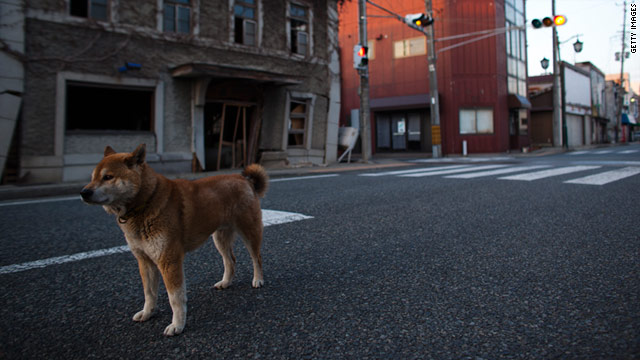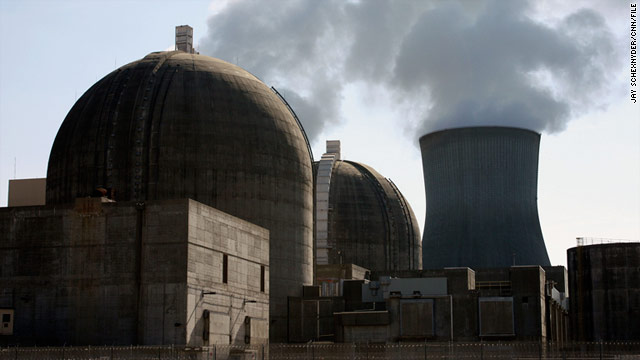princessleia
Proud Member
- Joined
- Jul 25, 2011
- Messages
- 133
- Points
- 0
http://english.kyodonews.jp/news/2011/04/85020.html
Japan ups Fukushima nuke crisis severity to 7, same as Chernobyl
TOKYO, April 12, Kyodo
Japan on Tuesday raised the severity level of the ongoing emergency at the crippled Fukushima Daiichi nuclear power plant from level 5 to the maximum 7 on an international scale, recognizing that the tsunami-caused accident matches the world's worst nuclear catastrophe in 1986 at Chernobyl.
The government's Nuclear and Industrial Safety Agency upgraded its provisional evaluation based on an estimate that radioactive materials far exceeding the criteria for level 7 have so far been released into the external environment, but added that the release from the Fukushima plant is about 10 percent of that from the former Soviet nuclear plant.
The nuclear regulatory agency under the Economy, Trade and Industry Ministry and the Nuclear Safety Commission of Japan, a government panel, said that between 370,000 and 630,000 terabecquerels of radioactive materials have been emitted into the air from the Nos. 1 to 3 reactors of the plant.
...
The plant operator Tokyo Electric Power Co. offered an apology to the public for being still unable to stop the radiation leakage, pointing to the possibility that the total emission of radioactive substances could eventually surpass that of the Chernobyl incident.
...
The safety commission said it estimates the release has come down to under 1 terabecquerel per hour.
...
Hirose of the Cabinet Office ruled out the possibility that the evacuation zone set by the government within 20 kilometers from the plant will be reviewed following the upgrading of the severity level.
...
The INES only reflects radiation emitted into the air, and Japan needs to independently assess the severity of the incident by also monitoring contamination levels in the sea and soil, he said.
Earlier, the safety commission released a preliminary calculation for the cumulative amount of radiation, saying it has exceeded the yearly limit of 1 millisievert in areas extending more than 60 km northwest of the plant and about 40 km south-southwest of the plant.
Within the 20-km exclusion zone, the amount varied from under 1 millisievert to 100 millisieverts or more, and in the 20-30 km ring where residents are asked to stay indoors it came to nearly 50 millisieverts.
==Kyodo
------
http://english.kyodonews.jp/news/201/04/85030.html
Workers start removing toxic water in level 7-rated nuke crisis
TOKYO, April 13, Kyodo
....
Some 700 tons are to be transferred to a ''condenser'' where in normal operations steam created from the reactor is converted into water. The operation is expected to take 40 hours.
Still there is a long road ahead to remove a total of some 60,000 tons of contaminated water, found in the basements of the Nos. 1 to 3 reactor turbine buildings as well as the trenches connected to them, and to store it in nearby tanks and other areas.
....
Economy, Trade and Industry Minister Banri Kaieda told a press conference a large part of the radioactive materials release took place in the early days of the crisis when hydrogen explosions occurred, and that Tokyo Electric, known as TEPCO, is working hard to prevent a recurrence.
''As we have not been completely able to block radioactive substances from scattering, it is true that the amount of release would continue to increase...but we do not expect at this moment that the amount would drastically increase,'' Kaieda said.
While the strong aftershock on Monday resulted in the suspension of an operation to inject nitrogen into the No. 1 reactor to reduce the potential risks of hydrogen explosion, the government's Nuclear and Industrial Safety Agency said that the work resumed and was not affected in the Tuesday afternoon quake.
....
------
A recount of the events and communications between TEPCO and the government on the very first day, with lots of new info, a must read: http://www.yomiuri.co.jp/dy/national/T110411004567.htm
-----
http://michiganmessenger.com/48140/group-recommends-steps-to-limit-fallout-exposure
A French radiation research group is recommending that pregnant and nursing women and small children in Europe limit consumption of fresh milk and cheese and leafy vegetables in order to reduce exposure to radioactive fallout from the ongoing Fukushima nuclear disaster.
A report by the research group CRIIRAD states that spinach, cabbage and other vegetables with large surface areas are especially sensitive to iodine-131 contamination in rainwater, and that fresh milk and creamy cheeses can be contaminated if made from the milk of animals that have grazed on grass, Euractiv.com reports.
....
Last week the U.S. Environmental Protection Agency found that milk in Phoenix and Little Rock contained more than the maximum allowable level of iodine-131. It also found cesium-137 in milk from Vermont.
-----
Radioactive Japanese cars detained in Russia’s Far East (20 cars, twice the amount of normal radiation)
http://rt.com/news/prime-time/radioactive-japanese-cars-russia/
------
A website worth visiting: http://www.helencaldicott.com/about/
Japan ups Fukushima nuke crisis severity to 7, same as Chernobyl
TOKYO, April 12, Kyodo
Japan on Tuesday raised the severity level of the ongoing emergency at the crippled Fukushima Daiichi nuclear power plant from level 5 to the maximum 7 on an international scale, recognizing that the tsunami-caused accident matches the world's worst nuclear catastrophe in 1986 at Chernobyl.
The government's Nuclear and Industrial Safety Agency upgraded its provisional evaluation based on an estimate that radioactive materials far exceeding the criteria for level 7 have so far been released into the external environment, but added that the release from the Fukushima plant is about 10 percent of that from the former Soviet nuclear plant.
The nuclear regulatory agency under the Economy, Trade and Industry Ministry and the Nuclear Safety Commission of Japan, a government panel, said that between 370,000 and 630,000 terabecquerels of radioactive materials have been emitted into the air from the Nos. 1 to 3 reactors of the plant.
...
The plant operator Tokyo Electric Power Co. offered an apology to the public for being still unable to stop the radiation leakage, pointing to the possibility that the total emission of radioactive substances could eventually surpass that of the Chernobyl incident.
...
The safety commission said it estimates the release has come down to under 1 terabecquerel per hour.
...
Hirose of the Cabinet Office ruled out the possibility that the evacuation zone set by the government within 20 kilometers from the plant will be reviewed following the upgrading of the severity level.
...
The INES only reflects radiation emitted into the air, and Japan needs to independently assess the severity of the incident by also monitoring contamination levels in the sea and soil, he said.
Earlier, the safety commission released a preliminary calculation for the cumulative amount of radiation, saying it has exceeded the yearly limit of 1 millisievert in areas extending more than 60 km northwest of the plant and about 40 km south-southwest of the plant.
Within the 20-km exclusion zone, the amount varied from under 1 millisievert to 100 millisieverts or more, and in the 20-30 km ring where residents are asked to stay indoors it came to nearly 50 millisieverts.
==Kyodo
------
http://english.kyodonews.jp/news/201/04/85030.html
Workers start removing toxic water in level 7-rated nuke crisis
TOKYO, April 13, Kyodo
....
Some 700 tons are to be transferred to a ''condenser'' where in normal operations steam created from the reactor is converted into water. The operation is expected to take 40 hours.
Still there is a long road ahead to remove a total of some 60,000 tons of contaminated water, found in the basements of the Nos. 1 to 3 reactor turbine buildings as well as the trenches connected to them, and to store it in nearby tanks and other areas.
....
Economy, Trade and Industry Minister Banri Kaieda told a press conference a large part of the radioactive materials release took place in the early days of the crisis when hydrogen explosions occurred, and that Tokyo Electric, known as TEPCO, is working hard to prevent a recurrence.
''As we have not been completely able to block radioactive substances from scattering, it is true that the amount of release would continue to increase...but we do not expect at this moment that the amount would drastically increase,'' Kaieda said.
While the strong aftershock on Monday resulted in the suspension of an operation to inject nitrogen into the No. 1 reactor to reduce the potential risks of hydrogen explosion, the government's Nuclear and Industrial Safety Agency said that the work resumed and was not affected in the Tuesday afternoon quake.
....
------
A recount of the events and communications between TEPCO and the government on the very first day, with lots of new info, a must read: http://www.yomiuri.co.jp/dy/national/T110411004567.htm
-----
http://michiganmessenger.com/48140/group-recommends-steps-to-limit-fallout-exposure
A French radiation research group is recommending that pregnant and nursing women and small children in Europe limit consumption of fresh milk and cheese and leafy vegetables in order to reduce exposure to radioactive fallout from the ongoing Fukushima nuclear disaster.
A report by the research group CRIIRAD states that spinach, cabbage and other vegetables with large surface areas are especially sensitive to iodine-131 contamination in rainwater, and that fresh milk and creamy cheeses can be contaminated if made from the milk of animals that have grazed on grass, Euractiv.com reports.
....
Last week the U.S. Environmental Protection Agency found that milk in Phoenix and Little Rock contained more than the maximum allowable level of iodine-131. It also found cesium-137 in milk from Vermont.
-----
Radioactive Japanese cars detained in Russia’s Far East (20 cars, twice the amount of normal radiation)
http://rt.com/news/prime-time/radioactive-japanese-cars-russia/
------
A website worth visiting: http://www.helencaldicott.com/about/



